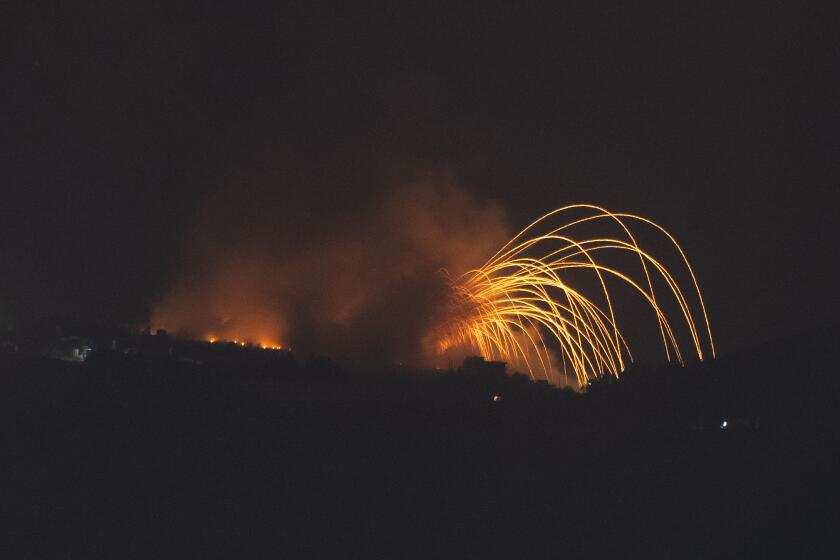Turkish leader says Dutch will ‘pay the price’ for not letting his ministers campaign
Reporting from Rotterdam, Netherlands — Turkish President Recep Tayyip Erdogan drove his dispute with European nations to the hilt Sunday, claiming that “Nazism is alive in the West” after two of his ministers were prevented from campaigning in the Netherlands over the weekend.
While Dutch Prime Minister Mark Rutte worked to contain the diplomatic damage from his unusual actions, Erdogan made it clear during an address broadcast live that Turkey wouldn’t be easily appeased.
He said Ankara would retaliate for the ousting of the Turkish family affairs minister from the Netherlands in an unprecedented midnight standoff outside the country’s Rotterdam consulate between a high-level government official and police in full gear.
Earlier in the day, the Netherlands had already denied Foreign Minister Mevlut Cavusoglu landing rights to address crowds at a Rotterdam rally.
“I said ‘I thought Nazism was over,’ but I was wrong. In fact, Nazism is alive in the West,” he said from Istanbul, reviving memories of Europe’s darkest past in remarks similar to ones he made about Germany earlier this month.
To bolster support for an April 16 referendum that would expand the powers of Turkey’s president, Turkish cabinet ministers have been scheduling campaign trips to several European countries with sizable populations of Turkish expatriates.
However, some European nations say Turkey under Erdogan is slowly slipping toward dictatorial means, especially since an aborted coup of last summer. Rutte cited that concern in asking Cavusoglu not to come to the Netherlands.
The proposed constitutional changes would usher in a presidential system with a weak parliament, no prime minister and a subservient judiciary. Erdogan, already in power for 14 years, would be head of his party, government and state — and would be eligible to run for two more five-year terms.
The furor between two NATO allies comes at a crucial time in the Netherlands, where issues of Dutch identity, relations with migrant communities and Islam have taken center stage in the run-up to a national election on Wednesday.
In a neck-and-neck race, the parties of either Rutte or populist firebrand Geert Wilders could end up with the most votes.
Rutte said it was important for his government not to bow to Turkish pressure, especially, he said, after Ankara threatened sanctions if the Dutch kept its ministers out.
“Turkey is a proud nation; the Netherlands is a proud nation,” Rutte said. “We can never do business under those sorts of threats and blackmail.”
Rutte’s actions, which came two days after several German municipalities canceled rallies that Turkish Cabinet ministers had planned to address, prompted Erdogan on Saturday to accuse the Dutch of being “Nazi remnants.”
On Sunday, he further heaped on the criticism while demanding an apology from the Dutch.
“If you sacrifice Turkish-Dutch relations to the elections on Wednesday, then you will pay the price,” Erdogan warned.
“Those who treat my foreign minister, my economy minister, our legislator friends in a shameless way, will pay the price. Those who unleash the dogs and their hatred will pay the price,” he added in reference to images showing police dogs biting protesters.
Dutch Foreign Minister Bert Koenders said no apologies would be forthcoming.
Amid the sparring, Cavosoglu was allowed to campaign Sunday in the northern French city of Metz.
Alain Carton, secretary general of the Metz prefecture, said the rally presented no threat to public order and in the absence of such a risk, the rally was permitted in the name of the freedom of assembly.
About 100 supporters draped in Turkish flags greeted the minister as he reached the Centre des Congres of Metz with cheers of “Turkey” and “God is Great.”
The Netherlands said Turkish attempts to campaign here touched at the heart of Dutch citizenhood, although hundreds of thousands of residents have Turkish roots and many still feel committed to their ancestral homeland.
“The biggest problem in this case is that Turkey is talking about Turkish citizens who they want to talk to,” Rutte said. “These are Dutch citizens who possibly also have voting rights in Turkey.”
The prime minister added that his government “will keep working to de-escalate where we can. If the Turks choose to escalate, we will have to react, but we will do everything we can to de-escalate.”
Turkey’s family and social policies minister, Fatma Betul Sayan Kaya, was denied entry to the Turkish consulate in Rotterdam on Saturday where she was to campaign for the upcoming referendum in Turkey.
After a tense standoff outside the consulate on Saturday night, she was escorted back to the German border.
Kaya, speaking to reporters Sunday at Istanbul’s main airport, condemned Dutch authorities’ “anti-democratic” actions that she said “trampled on freedom of expression and right to assembly.”
“We were subject to very rude and harsh treatment,” she said.
Police in Rotterdam said they arrested 12 people as a demonstration outside the consulate devolved into rioting following Kaya’s ejection.
Police spokeswoman Patricia Wessels said the arrests, made on violence and public order offenses, came as protesters pelted police with bottles and rocks early Sunday. Police responded with baton charges and a water cannon.
Wessels says seven people were injured in the brief explosion of violence, including one police officer who suffered a broken hand.
MORE WORLD NEWS
Bone by bone, Iraqis unearth a mass grave: ‘We will be out there digging until no one is left’
Tensions across Asia present challenges to secretary of State’s first visit
South Korea’s ousted leader leaves the presidential palace, denies wrongdoing
India’s Narendra Modi leads his party to victory in a state with more than 200 million people
More to Read
Sign up for Essential California
The most important California stories and recommendations in your inbox every morning.
You may occasionally receive promotional content from the Los Angeles Times.










